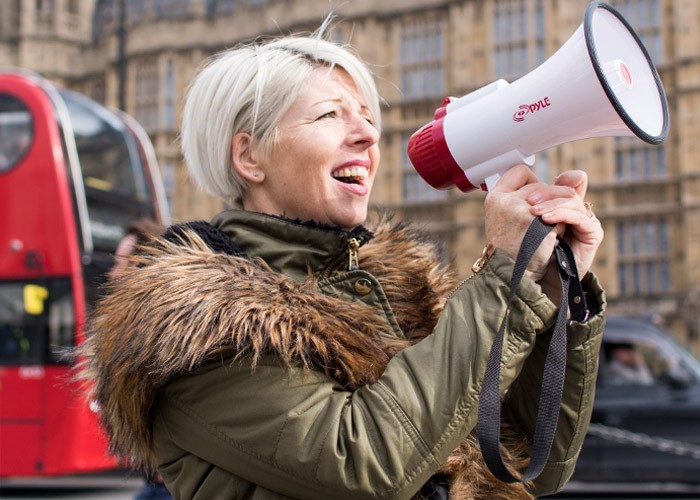Find out about the work the Policy and Campaigns team have been doing on behalf of people affected by breast cancer since lockdown.
Find out about the work the Policy and Campaigns team have been doing on behalf of people affected by breast cancer since lockdown.

Pushing for change for people living with breast cancer
During the pandemic, the Policy and Campaigns team carried on pushing for change for people living with breast cancer. From working with the press to highlight our concerns, to influencing Government policy and guidance across the UK - we have continued throughout to try and keep the needs of breast cancer patients high on the agenda.
Back in April, we asked supporters like you, to tell us how coronavirus was impacting your treatment and care. Thanks to over 580 supporters who shared their story, we highlighted the uncertainty and emotional impact of delays and changes to treatment and care to the press and raised the issues patients were facing with governments and the NHS.
The experiences you shared became powerful evidence to support the restoration and recovery of NHS cancer services; we used them in our June submission for the Health and Social Care Select Committee inquiry into delivering core NHS and Care services during the pandemic and beyond.
We also worked tirelessly to understand the vast amount of guidance published by different health bodies at the start of the outbreak. We highlighted issues in the guidance relating to the treatment priortisation tables. And, when we heard from several patients with secondary breast cancer concerned about how their condition may affect critical care decisions if they had coronavirus, we raised these concerns with NHS England and the Scottish Government. We received reassurances that these decisions should be based on an individual’s needs rather than age or medical condition. NHS England also wrote to all trusts and health care providers to reiterate this message.
We spoke to a range of healthcare professionals on the frontline to find out their views on the impact of the pandemic on breast cancer services and their patients. This, alongside the extensive work we had done to engage with the various guidelines, meant our clinical team were able to give the most up to date advice when you called our helpline or emailed our nurses.
We also took the chance to raise any concerns about this guidance for people living with breast cancer, in our weekly calls with the NHS and when working with the One Cancer Voice, a group of cancer charities working together to give consistent advice and information.
In July, our ongoing work looking into cancer waiting times and referrals, made the front pages of the Evening Standard. This highlighted that amid the coronavirus pandemic, compared to the same month last year, in May there was a 47% drop in breast cancer referrals.
Campaigning in the regions
In Scotland, we attended the Cross-Party Group on cancer alongside some of our secondary breast cancer campaigners, to make sure the Scottish Government took into account the impact of the pandemic on people living with breast cancer. We supported the Scottish Cancer Coalition in creating their 11-point recovery framework. And, we sat on the Scottish Breast Screening Programme Board, inputting into the restart of the breast screening programme.
Meanwhile in Wales, we fed into the Wales Cancer Alliance and spoke to the Welsh Health Minister, Vaughan Gething, about our priorities for restarting cancer services.
In Northern Ireland, we monitored new and changing guidance to support people affected by breast cancer throughout the pandemic.
Ensuring drugs access for patients
We’ve also been continuing our work to ensure clinically-effective breast cancer drugs can quickly reach patients at a price that is fair and sustainable for the NHS. We’ve been involved in several appraisals by the National Institute for Health and Care Excellence (NICE) and the Scottish Medicines Consortium (SMC) which have seen a number of new breast cancer drugs approved. During the pandemic, we have seen the approval by NICE of atezolizumab with nab-paclitaxel and adjuvant Kadcyla and the SMC’s approval of neratinib and adjuvant Perjeta. We are currently participating in appraisals for a number of secondary breast cancer drugs to ensure the patient voice is heard in the process of assessing each and every drug.
Our Chief Executive, Baroness Delyth Morgan, spoke in the House of Lords Charitable and Voluntary sector debate, highlighting the risks facing medical research charities like us. We are also continuing to work with the Association of Medical Research Charities to call on the Government to further support research charities. This would help us back some of the brightest minds in breast cancer research to carry on discovering how we can prevent, save lives and live well with breast cancer.
This is just the start of our work
We know we’ve still got a lot of work to do. In the coming weeks we will be sharing the results of our most recent survey into the impact of the pandemic on the care, treatment and experiences of people with breast cancer. Thank you if you were one of the 2,124 supporters who shared your experiences and for your incredible generosity, loyalty and encouragement, particularly at what is an uncertain time for everyone.
If you would like to be kept up to date on our work and ways in which you can take action to help people affected by breast cancer, sign up to receive campaign updates.
Sign up to recieve campaign updates